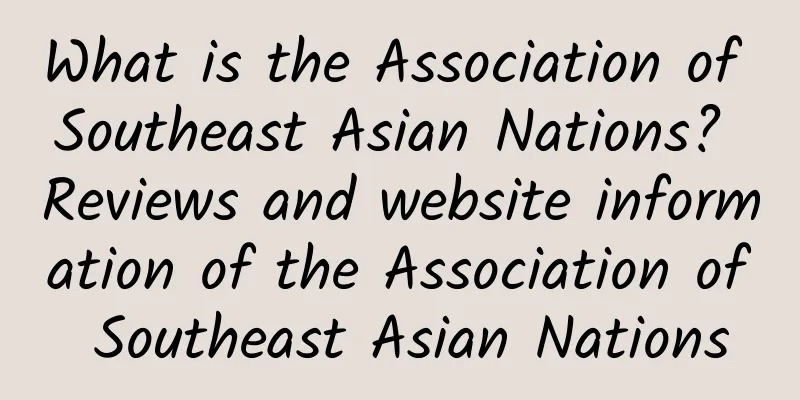What is the Association of Southeast Asian Nations? Reviews and website information of the Association of Southeast Asian Nations

|
What is the website of the Association of Southeast Asian Nations? The Association of Southeast Asian Nations (ASEAN) is a political, economic and security integration cooperation organization based on economic cooperation in Southeast Asia. It was established on August 8, 1967 and is headquartered in Jakarta, the capital of Indonesia. Its predecessor was the Southeast Asian Association established in Bangkok on July 31, 1961 by Malaya (now Malaysia), the Philippines and Thailand. The purpose of ASEAN is to jointly promote economic growth, social progress and cultural development in the region in the spirit of equality and cooperation, lay the foundation for the establishment of a prosperous and peaceful community of Southeast Asian nations, and promote peace and stability in the region. Website: www.aseansec.org The Association of Southeast Asian Nations (ASEAN) is a political, economic and security integration cooperation organization based on economic cooperation in Southeast Asia. ASEAN was established on August 8, 1967, with its headquarters in Jakarta, the capital of Indonesia. Its predecessor was the Southeast Asian Association established in Bangkok on July 31, 1961 by Malaya (now Malaysia), the Philippines and Thailand. The purpose of ASEAN is to jointly promote economic growth, social progress and cultural development in the region in the spirit of equality and cooperation, lay the foundation for the establishment of a prosperous and peaceful community of Southeast Asian countries, and promote peace and stability in the region. The background of the establishment of ASEAN can be traced back to the 1960s, when Southeast Asia was facing a series of political, economic and security challenges. In order to cope with these challenges, Southeast Asian countries decided to enhance their economic strength and regional influence through regional cooperation. On August 8, 1967, the foreign ministers of Indonesia, Malaysia, the Philippines, Singapore and Thailand signed the Declaration on the Establishment of the Association of Southeast Asian Nations (also known as the Bangkok Declaration) in Bangkok, marking the official establishment of ASEAN. ASEAN's founding declaration clearly states the organization's purpose and objectives, including:
Since its establishment, ASEAN has gradually expanded its membership. In 1984, Brunei joined ASEAN; in 1995, Vietnam joined; in 1997, Laos and Myanmar joined; and in 1999, Cambodia joined. So far, the number of ASEAN member states has expanded to 10, covering the entire Southeast Asian region. ASEAN's organizational structure includes the following major institutions:
ASEAN has made remarkable achievements in economic cooperation. In 1992, ASEAN countries signed the ASEAN Free Trade Area Agreement (AFTA), which aims to promote trade and investment among member countries by reducing tariffs and non-tariff barriers. The implementation of AFTA has greatly promoted the growth of trade within ASEAN, making ASEAN one of the most dynamic economic regions in the world. In addition, ASEAN has also actively promoted regional economic integration. In 2003, ASEAN countries signed the ASEAN Economic Community Blueprint, which aims to build a single market and production base by 2015 and realize the free flow of goods, services, investment and labor. On December 31, 2015, the ASEAN Economic Community (AEC) was officially established, marking a new stage in ASEAN economic integration. ASEAN also plays an important role in the political and security fields. In 1976, ASEAN countries signed the Treaty of Amity and Cooperation in Southeast Asia (TAC), which aims to resolve disputes through peaceful means and promote regional peace and stability. TAC was later adopted by the United Nations General Assembly and became an international treaty, attracting many countries including China, the United States, Russia, Japan, South Korea, India, Australia, etc. to join. ASEAN also actively promotes regional security cooperation. In 1994, ASEAN initiated the establishment of the ASEAN Regional Forum (ARF), which aims to promote peace and stability in the Asia-Pacific region through dialogue and cooperation. ARF is one of the most important multilateral security dialogue mechanisms in the Asia-Pacific region, covering ASEAN member states and their dialogue partners. ASEAN has also carried out extensive cooperation in the cultural and social fields. ASEAN countries have promoted mutual understanding and friendship among member states by hosting various cultural, educational, sports and exchange activities. In addition, ASEAN is also committed to promoting social development and improving the quality of life of the people, especially in the fields of education, health, environmental protection and disaster management. ASEAN is also playing an increasingly important role on the international stage. ASEAN maintains close cooperation with international organizations such as the United Nations, the World Trade Organization, and the Asia-Pacific Economic Cooperation. In addition, ASEAN has established dialogue partnerships with China, Japan, South Korea, India, Australia, New Zealand and other countries, and has promoted cooperation and development in East Asia through mechanisms such as ASEAN+3 and ASEAN+6. In general, ASEAN has played an important role in promoting peace, stability and prosperity in Southeast Asia over the past 50 years since its establishment. Through regional cooperation, ASEAN has strengthened economic ties among its member states, promoted regional economic integration, and promoted regional peace and stability. In the future, ASEAN will continue to be committed to building a closer and more united Southeast Asian community and make new contributions to regional peace and development. The official website of ASEAN is www.aseansec.org, which provides detailed information about ASEAN, including its history, organizational structure, member states, areas of cooperation, latest developments, etc. Through this website, people can learn about the latest developments in ASEAN, access various resources and documents about ASEAN, and contact the ASEAN Secretariat. ASEAN faces some challenges in its future development, including economic differences among member states, political disagreements, and intervention by external powers. However, ASEAN will continue to play an important role in Southeast Asian and even global affairs by strengthening internal unity, deepening regional cooperation, and expanding external relations. ASEAN's successful experience provides a model for other regions to learn from. Through regional cooperation, ASEAN has not only enhanced its economic strength and international influence, but also made important contributions to regional peace and stability. In the future, ASEAN will continue to promote regional integration and build a more prosperous and peaceful Southeast Asian Community. The establishment and development of ASEAN fully reflects the determination and wisdom of Southeast Asian countries to achieve common development through cooperation. As globalization deepens, ASEAN will continue to play its unique role and make new contributions to peace and development in Southeast Asia and the world. The story of ASEAN is a story of cooperation, unity and success. Through regional cooperation, ASEAN countries have not only achieved their own economic development and social progress, but also made important contributions to regional peace and stability. In the future, ASEAN will continue to be committed to promoting regional integration and building a more prosperous and peaceful Southeast Asian Community. ASEAN's future is full of hope and challenges. By strengthening internal unity, deepening regional cooperation and expanding external relations, ASEAN will continue to play an important role in Southeast Asian and even global affairs. ASEAN's successful experience provides a model for other regions to learn from, demonstrating the huge potential for achieving common development through regional cooperation. In short, the Association of Southeast Asian Nations is an integrated political, economic and security cooperation organization based on economic cooperation in Southeast Asia. Since its establishment in 1967, ASEAN has played an important role in promoting peace, stability and prosperity in Southeast Asia. In the future, ASEAN will continue to be committed to building a closer and more united Southeast Asian community and make new contributions to regional peace and development. |
<<: What is Deutsche Welle like? Deutsche Welle reviews and website information
Recommend
How is the Ecole Centrale Lyon? Reviews and website information of Ecole Centrale Lyon
What is the website of École Centrale de Lyon? Éco...
What foods are allergic to when eaten together
Since ancient times, my country has always been p...
The molting process of Lithops How to cut off the water of Lithops
Lithops is a kind of succulent plant that grows c...
How is César Ritz University? César Ritz University Reviews and Website Information
What is the website of Cesar Ritz Colleges? Cesar ...
Benefits of fennel porridge
I believe everyone is unfamiliar with the effects...
The efficacy and function of cucumber seeds
Cucumber is a vegetable that everyone is very fam...
The efficacy and function of golden rose
The golden-edged rose is a beautiful ornamental p...
How to make delicious beans? Ingredients and steps for making delicious beans
In daily life, beans are eaten as cooked food. In...
The effects and functions of drinking chrysanthemum in water, the side effects and contraindications of drinking chrysanthemum in water
In the eyes of most people, chrysanthemum is a be...
Eight Treasure Porridge
I believe everyone is familiar with Eight Treasur...
How is MaxMara? MaxMara review and website information
What is MaxMara? MaxMara is a famous Italian fashi...
How is the online fighting game of Soul Calibur? Review and website information of the online fighting game of Soul Calibur
What is the website of SoulCalibur? SoulCalibur is...
What are the medicinal effects of orange peel? What are the medicinal values of orange peel?
Orange peel is very common in life. It is the pee...
How to cultivate Camellia sasanqua What should be paid attention to when cultivating Camellia sasanqua
Camellia sasanqua is a beautiful ornamental plant...
What are the benefits of drinking bitter melon tea?
We all know that bitter melon has the effect of d...









